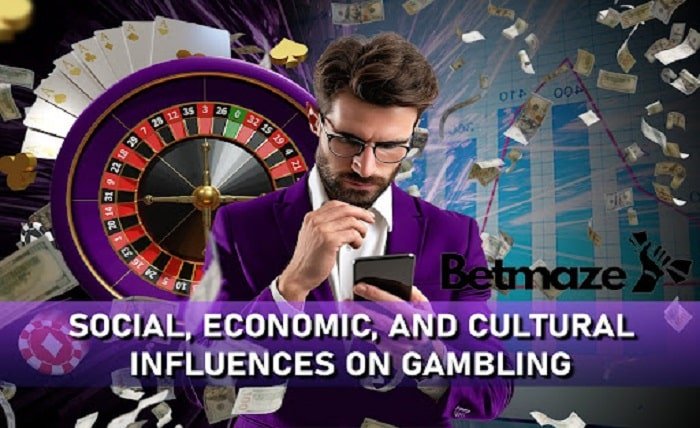The psychology behind why people enjoy gambling is fascinating. As human beings, we are wired to seek out excitement and take risks. When you play games of chance, like online slots or poker, you experience an adrenaline rush from not knowing the outcome. There is an inherent appeal in the uncertainty and potential rewards.
Online casinos, a frequent subject of analysis on https://betmaze.net/, tap into this desire for thrill-seeking. With just a few clicks, you can access a wide selection of games that provide that heart-pounding feeling. The convenience and variety keep players coming back for more. Although the odds are statistically against you, the allure of hitting the jackpot or winning big drives continued participation. It activates the brain’s pleasure centers and leaves you wanting more.
Positive Feelings Associated with Gambling
The thrill and excitement of online gambling light up the pleasure centers of the brain, releasing feel-good chemicals like dopamine and creating an intoxicating high. This neurological and emotional payoff keeps players coming back for more.
In the moment, the unpredictability of online games provides a sense of suspense and control. Will luck be on your side this round? The rolling anticipation taps into the competitive urge to outsmart the machine and other players. Small wins deliver triumphant joy.
Over time, the ups and downs of winning and losing also foster community between online gamers. Sharing victories and commiserating losses with a group of fellow enthusiasts enhances social bonds. For some, the connections built around internet gaming sites become a valued second family.
Amazing Online Casinos’ Impact on Gambling Behavior
The emergence of online casinos in the past few decades has profoundly impacted gambling behavior and psychology. As opposed to land-based venues, virtual platforms provide unparalleled accessibility, convenience, and variety that cater to different motivations.
Specifically, the ability to gamble anytime and anywhere fuels the allure for many individuals. Without having to travel or even change out of pajamas, players can log in within seconds to access hundreds of games. Such frictionless access poses risks, especially for vulnerable groups prone to addictive tendencies. However, for recreational gamblers, the convenience enables responsible entertainment.
Furthermore, web-based casinos boast seemingly limitless libraries with niche genres absent in brick-and-mortar establishments. This diversity suits differing motivations – whether one enjoys poker, slots, or sports betting. Consequently, online platforms better satisfy personal preferences.
However, the isolation of gambling alone at home raises ethical questions. Some experts argue the removal of social stimuli associated with physical casinos may promote irresponsible behavior. Nonetheless, virtual venues continue updating features that foster player interaction.
Social, Economic, and Cultural Influences on Gambling
 Gambling activities don’t exist in a vacuum. They are shaped by the social, economic, and cultural contexts around them. The norms, values, and financial situations within a society can significantly impact gambling behavior.
Gambling activities don’t exist in a vacuum. They are shaped by the social, economic, and cultural contexts around them. The norms, values, and financial situations within a society can significantly impact gambling behavior.
For instance, in cultures that emphasize recreation and entertainment, gambling is more likely to be viewed as a mainstream pastime. However, in societies grappling with economic uncertainty, gambling may be seen more as a desperate attempt to quickly get rich. These perspectives guide whether gambling is encouraged, tolerated, or condemned.
Some specific sociocultural factors that sway gambling practices:
- Income level – Those with lower incomes may gamble hoping to win much-needed money. Wealthier individuals can afford to play mostly for leisure.
- Moral views – Regions with religious objections to gambling often have tighter regulations. But other areas permit it as harmless amusement.
- Gender roles – Men have traditionally dominated public gambling spaces, but online venues provide new options for female players.
- Advertising trends – Increased marketing for lotteries, sports betting, or other games can normalize gambling. Young people are especially susceptible.
By better understanding the layered social and cultural dynamics that enable gambling behaviors, we can pursue responsible policies that balance personal freedom with protection from exploitation.
Energetic Escape: How Gambling Provides Respite from Stress
Many individuals see gambling as an opportunity to take a break from daily worries and enter a world of chance and fortune. The lights, sounds, and fast-paced action of games like online slots or roulette create an energizing atmosphere that transports players out of stressful thoughts.
In the moments spent hitting a spin button or watching a ball bounce around a wheel, mundane anxieties fade into the background. The singular focus and thrill of potential wins or losses fills the mind, providing a reprieve from lingering concerns about work, relationships, finances, and other struggles.
While immersed in games of chance, people can feel liberated, at least temporarily, from the strains of normal life. The fluctuation between risk and reward lights up the brain’s pleasure centers, releasing feel-good neurotransmitters that wash away negative emotions. For some, this escape starts as entertainment but can progress into a hazardous compulsion. Still, many continue returning to reopen that doorway to energetic escape.
Joyfulness Gambling: The Role of Illusion of Control
Many individuals decide to try their luck at online gaming due to the illusion of control. This refers to the tendency to believe that one can influence unpredictable outcomes even in games of pure chance.
When playing games online, certain factors can reinforce this illusion. For example:
- The ability to choose bet sizes and when to quit
- Familiarity with the rules and interface
- Superstitious beliefs about “hot” and “cold” streaks
An introduction before the feeling of control motivates people to keep playing and chasing wins. However, this often leads to bigger losses over time. Understanding the randomness behind games is important for making informed decisions.





